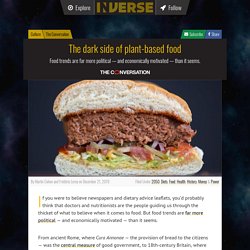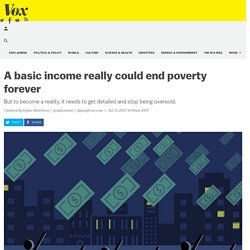

The dark side of plant-based food. If you were to believe newspapers and dietary advice leaflets, you’d probably think that doctors and nutritionists are the people guiding us through the thicket of what to believe when it comes to food.

But food trends are far more political — and economically motivated — than it seems. That’s why tariffs and other trade restrictions on imported food and grain were enforced in Britain between 1815 and 1846. These “corn laws” enhanced the profits and political power of the landowners at the cost of raising food prices and hampering growth in other economic sectors. Over in Ireland, the ease of growing the recently imported potato plant led to most people living off a narrow and repetitive diet of homegrown potato with a dash of milk. When potato blight arrived, a million people starved to death, even as the country continued to produce large amounts of food — for export to England.
Why so many dog rescuers are buying animals from the breeders they scorn. Ce que révèle l'enquête sur le meurtre de Mireille Knoll. Ce vendredi 23 mars 2018, il est 18h33 lorsque madame B. compose le "18" sur les touches de son téléphone.

Elle aperçoit des flammes lécher l'appartement de sa voisine et amie Mireille Knoll, une retraitée juive de 85 ans. A l'opérateur, elle précise qu'elle a vu "deux individus" dont "un de type européen" s'enfuir de l'immeuble. Les pompiers foncent dans cette résidence HLM de la rue Philippe Auguste (11e arrondissement de Paris) et découvrent avec horreur une scène de crime. La vieille dame est retrouvée morte sur son lit, carbonisée sur l'ensemble du côté gauche du corps. Elle présente en outre 11 plaies -profondes de trois à quatre centimètres- provoquées par une arme blanche, surtout au niveau du dos. Les pompiers parviennent à éteindre les quatre départs de feu, allumés à la hâte par les auteurs. Un voisin et un marginal arrêtés Qui a tué Mireille Knoll, cette rescapée de la rafle du Vel' d'Hiv que tout le monde décrit comme "ouverte", voire "pas assez méfiante"? Corrupted by grifters and charlatans, evangelicalism has devolved into an anti-American hate group.
How to read and understand a scientific paper: a guide for non-scientists – Violent metaphors. Update (1/3/18) I’ve been overwhelmed with requests for the shorter guide, and the email address below no longer works.

How Corporations and the Wealthy Avoid Taxes (and How to Stop Them) By Gabriel Zucman A professor of economics at the University of California, Berkeley and author of “The Hidden Wealth of Nations.”

The United States loses, according to my estimates, close to $70 billion a year in tax revenue due to the shifting of corporate profits to tax havens. That’s close to 20 percent of the corporate tax revenue that is collected each year. This is legal. Meanwhile, an estimated $8.7 trillion, 11.5 percent of the entire world’s G.D.P., is held offshore by ultrawealthy households in a handful of tax shelters, and most of it isn’t being reported to the relevant tax authorities. This is… not so legal. A basic income really could end poverty forever. I first heard the term “basic income” in the socialist magazine Dissent in 2005.

I was a 15-year-old leftist with a taste for weird, radical plans to restructure society: say, having the government buy up majority stakes in every company and then distribute them equally to every American; converting all companies into worker cooperatives; trying a planned economy where the planning is done by decentralized worker and consumer councils rather than a government bureaucracy. Basic income, wherein the government gives everyone enough cash to live on with no strings attached, struck me as an idea in that mold: another never-going-to-happen but fun-to-think-about alternative to the unfettered financial capitalism of the second Bush term.
Boy was that wrong. In a little over a decade, basic income has gone from an idea about as fringe as #FullCommunism to something that could be benefiting 1.2 billion people imminently. How To Check All The Apps You've Authorized With Your Google, Facebook, And Twitter Accounts - BuzzFeed News. Obama's economic legacy ensures Democrats decades of success. Progressive reformers of the early 20th century must have considered the Great Depression a mixed blessing.

While the crisis left many working-class Americans nearly penniless, Democrats kicked ass in every presidential election from 1932-48. But since then they haven’t won more than two straight contests for the White House, which would seem to bode poorly for them next month. On November 8th, they’ll attempt to win a three-peat for the first time in 70 years, something they also tried to do in 1920, 1968 and 2000. In those elections, Democrats came up short. Floridians Overwhelmingly Support Solar In Tuesday Vote – ThinkProgress.
The most thorough, profound and moving defense of Hillary Clinton I have ever seen. At the Seder Dinner as 60 Million Refugees Wander in the Wilderness.